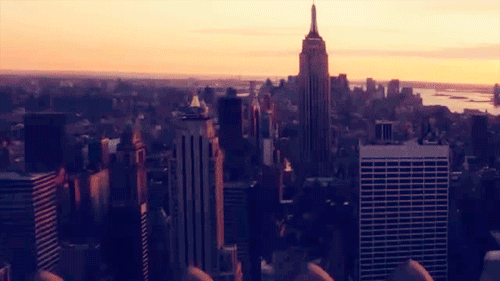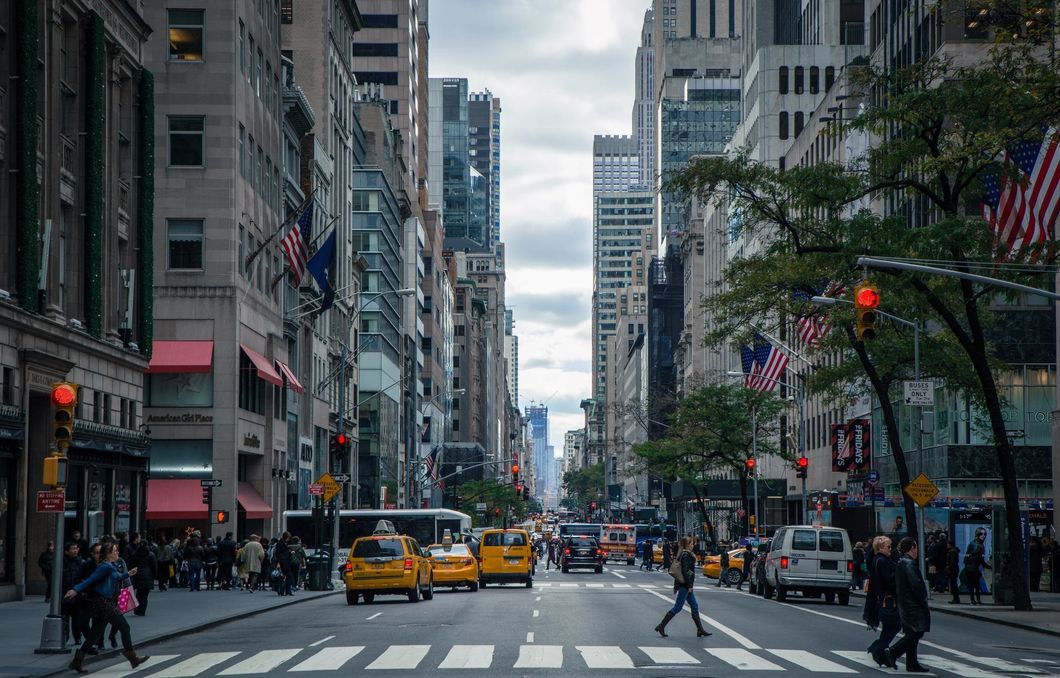By my last week of studying in Korea I felt like I was back in elementary school at a sleepover: at first I was really enjoying myself, but halfway through I was hiding in the closet calling my mom like "Please come get me" and giving a close relative a life-threatening disease to explain to my friends why I had to leave.
I was expecting to stroll back into the arms of my country (with reservations, of course) with a newfound appreciation for our way of life; however, since stepping off of the boat I have felt like I was in some dystopian movie in which excess and overabundance has become one of the identifying features of society (think Brave New World).
I'm 85% sure we live in a fantasy land and just don't know it.
Why is everything so big?

Skyscrapers are everywhere.
Cars. Buildings. Homes. Trees. Schools. Animals. Portions. Everything is huge. Bigger than it needs to be, really. Surprisingly, it is not the size of things that is most jarring, it is the fact that even with all these humongous buildings and things, there is still so much space.
Who needs all this space?
What the US probably looks like to foreigners.
The first day I was back, even the places that I knew were more foreign than familiar (I was literally lost in my hometown). After coming from a place that is as densely populated as South Korea, seeing all of this wide open space has been quite jarring. I understand that there is space because we have space, but it is almost as if it functions as a way of keeping more than just a physical distance from each other.
Even in situations where the amount of walking from one place to another would be the same in South Korea as here, the atmosphere of walking is different, as sidewalks and the areas around them are unkempt more often than not in the suburbs, and in the city they are functional but still somehow seem like more of an afterthought.
Where is everybody?
What outside is like.
As a result of the distance between places, everyone is either in the car on the way to where they are going, or they have arrived and are indoors. I was surprised that this bothered me the way that it did, as it's something that makes logical sense; however, walking through the streets of Seoul, being surrounded by other people had a way of grounding one's place in time and society. They were tangibles that shaped reality and reminded you of where you had been, where you were, and where you were going. Here, it is difficult to situate oneself, as there is no visible social landscape to do so in; only space, space, and more space.
Ya'll really out here talking to strangers?
South Koreans @ strangers
You would think that a society as homogeneous as South Korea would foster a sort of open, cohesive public who draw comfort from knowing that they all have so much in common. Surprisingly, that isn't the case. Strangers do not talk to each other, approach one another, or even tell the girl that just came out of the bathroom that she has toilet paper stuck to her shoe. They keep to themselves. Instead of fostering camaraderie, it has hindered the need to really pay attention to the people around you. Korean social life is centered around family, friends, and work and all personal connections stem from those three places.
Therefore, the strangers on the bus, the waitress at the coffee shop, and the cute girl walking down the street are merely another part of the landscape. I've become so accustomed to this, that I am still struggling to remember to say "excuse me" (in English) or "bless you" and to not be surprised when someone compliments my outfit or when a man in the mall strikes up a conversation to try to sell my boyfriend an engagement ring.
All these races? Together? Wild.

The Great American Melting Pot
Walking through the airport after arriving was crazy for me, as I grew up in a diverse area and at one point would be uncomfortable in a space that was not. I believe that we as a people grow to take for granted the beauty of seeing so many different types of people in so many spaces as an everyday occurrence. I became so used to being surrounded by Korean people that even seeing people of my own race was surprising and jarring for me. Coming back has really helped to put xenophobia into perspective for me, while also making me appreciate the beauty of a country that is a home for any and everyone even if some people are treated like the least favorite stepchild.
So you just don't care how you look?
How it seems everyone feels about their appearance.
As a result of being homogeneous, South Korea's beauty standards are very set and (with the help of a booming plastic surgery industry) attainable for nearly everyone. Don't get me wrong, there is an abundance of phenotypic variation in the society; however, a beauty standard that asks for slightly bigger eyes and a more narrow face is completely different from one that asks everyone to be white. That being said, the resulting social phenomena inspires everyone to care about their appearance. It was rare to find anyone in public wearing athletic clothing, and if they were it was very obviously because they could not fit any of the other options (People aren't joking when they talk about how small sizing is in Asia).
Coming home and seeing people in sweats, leggings and sports bras etc. has really made me question our society whose standards seem to put sexualization and low effort before actually looking put together.
Shopping here sucks (and everything is overpriced).
Me arriving at (and leaving) the mall.
At the same time, I can't blame people for this, as I have come to realize that shopping in the United States sucks. So the people who aren't trying may not be doing so because of the amount of money and effort it takes to acquire clothing in this country. In South Korea, there are little boutiques and shops everywhere. They are close together and everything is reasonably priced. Given my newfound enjoyment of shopping, after coming home, I've attempted to do so here. It's been terrible. Malls are awful, prices are ridiculous, and everything is so spread out. People may actually do more walking in the mall than they do anywhere else in the United States. It's exhausting. I remember why I hate it.
Ya'll have never heard of portion control, huh?

Eating in America
I lost over 10 lbs in 6 weeks in Korea, and I am 99% sure I gained them all back after one meal. Portions here are so big, not because they are particularly larger than those in South Korea, but because they are designed for one person. I've been struggling to finish every meal because I have become so accustomed to eating with others and sharing the food. People here don't share. We gorge ourselves on large amounts of food pumped full of preservatives and bathed in chemicals or cooked to the point of having a fraction of its nutritional value. Then, after eating our large unhealthy portions, we go to our cars or couches and sit. Yet we wonder about the cause of obesity in America.
All this sugar? And carbs?
Basically us and the food we eat.
Hey, America. There are other ways to season food outside of sugar and salt. You should try it sometime.
Don't look at me.
How men stare at women in America
I decided to put this one last, because out of every other point on this list, this one is the most upsetting and surprising for me. There is nothing like leaving and returning to your home to illuminate all of the little things you trained yourself to ignore. This thing is double-edged, in that it is disturbing and the fact that people accept it as a way of life is equally disturbing. Staring is an interesting phenomenon, in that it is not always a bad thing. There is 'curious staring', 'wow you're beautiful staring' and 'uhm you have something on your face' staring.
In Korea, being a foreigner, I received many curious and inquisitive stares, but what I am talking about is completely different. The way that men in the United States visually assault oogle women is baffling. I have watched workers turn their back on a customer (while still talking to them and answering their question) just to stare at a woman's butt as she walks away. I have watched as men have slowed down to walk past me and aggressively stare into my eyes in an overwhelmingly dominant manner (while I'm with my boyfriend!) as if to accost me in the middle of Walmart. I have even seen young teenage boys exhibit the same behavior. It was only after I found myself saying "Don't f****** look at me" out loud, that I realized how big of an issue it really is, because it is one of those things that you are defenseless to.
I really did miss home. But now that I am here, I find that I am missing the 한국 생활 방식. Every place has its pros and cons, but coming home has made me realize just how much work we have to do.

















